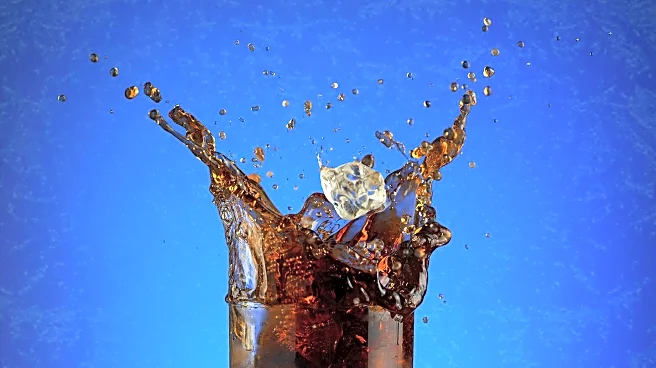What's Happening?
Recent research presented at United European Gastroenterology Week 2025 indicates that beverages marketed as 'healthy' alternatives to traditional sodas may pose a risk to liver health. The study analyzed data from 103,251 participants in the UK Biobank, focusing on their consumption of sugar-sweetened and low- or non-sugar-sweetened beverages. Findings revealed that consuming more than 250 grams of these drinks daily significantly increased the risk of developing metabolic dysfunction-associated steatotic liver disease (MASLD), formerly known as non-alcoholic fatty liver disease. The risk was found to be 50% higher for sugar-sweetened beverages and 60% higher for low- or non-sugar-sweetened beverages. The study suggests that even beverages with artificial sweeteners can affect liver health by altering the gut microbiome and influencing insulin secretion.
Why It's Important?
The findings challenge the perception that low- or non-sugar-sweetened beverages are a healthier choice, highlighting potential health risks associated with their consumption. MASLD is a serious condition that can lead to liver scarring, end-stage liver disease, and increased risk of heart disease and diabetes. This research underscores the importance of scrutinizing dietary choices and the potential long-term health impacts of consuming artificially sweetened beverages. The study's implications are significant for public health, as it suggests that even 'health-oriented' drinks may contribute to liver disease, urging consumers to reconsider their beverage choices.
What's Next?
The study's authors recommend further investigation into the mechanisms by which artificially sweetened beverages contribute to liver disease. Public health officials and nutrition experts may need to reassess dietary guidelines and consumer education regarding beverage consumption. As awareness of these findings grows, there may be increased advocacy for clearer labeling and marketing practices for beverages. Consumers are encouraged to prioritize water and other non-sweetened drinks to mitigate health risks.
Beyond the Headlines
The study raises questions about the broader implications of artificial sweeteners on metabolic health and the potential psychological effects of consuming 'healthy' sodas. It suggests that these beverages might lead to compensatory eating behaviors, where individuals consume more sugary or fatty foods, negating the perceived benefits of low-calorie drinks. This highlights the complex relationship between diet, consumer behavior, and health outcomes.









